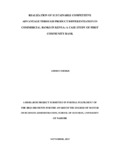| dc.description.abstract | A firm is said to have a sustained competitive advantage when it is implementing a
value creating strategy not simultaneously being implemented by any current or
potential competitors and when these other firms are unable to duplicate the benefits
of this strategy. To succeed in building a sustainable competitive advantage, a firm
must try to provide what buyers will perceive as superior value. This entails either a
good quality product that is worth paying for even if a premium has been charged or a
fairly priced product capable of satisfying the buyers needs. The main objective of the
study was to establish the extent to which product differentiation enhances sustainable
competitive advantage in commercial banks in Kenya. Case study research design was
adopted in this study. Data collection was from primary and secondary sources. Data
was analysed using thematic and content analysis.Analysis of the findings shows that
differentiation strategies are greatly used by commercial banks in Kenya to remain
competitive. This can be attributed to the changes in business focus from being cost
leaders to being customer focused. The greatly used strategies are broad
differentiation involving maintaining strong relationship with customers, identifying
needs of customers, and improved customer service, offering professional services to
customers among others. Many of these strategies focus on the customer because it is
the key for any business success especially for First Community Bank. The next
greatly used strategies were those of narrow differentiation involving improved
customer service, identifying needs of customers, reputation on quality and service,
and offering professional service to customer. From the findings, it was established
that a differentiation strategy is based upon persuading customers that a product is
superior in some way to that offered by competitors. The respondents were requested
to indicate the challenges facing First Community Bank during implementation of
product differentiation strategies. From the findings, lack of sufficient resources,
regulations from CBK and lack of skills and knowledge on how to develop product
that suits the market were the main challenges to effective implementation of product
differentiation. The First Community Bank should adopt differentiation strategies that
address needs of specific market segments. To achieve this, clients’ needs must be
identified by way of continuously seeking customer feedback and promptly
addressing them. So as to adequately address customers need the clients should be
involved in product development. Research has shown that customer preferences keep
changing, which translates into a guiding principle that products must keep changing
so as to ensure sustained customer satisfaction. The study investigated the extent to
which banks achieve sustainable competitive advantage through product
differentiation focusing on First Community Bank. The study recommends that a
further study should be carried out to establish ways through which banks could
enhance product differentiation so as to improve customer satisfaction and enhance
positive perception on banks. A further study should be carried out to establish the
effects of product differentiation on financial performance of commercial banks. | en_US |

